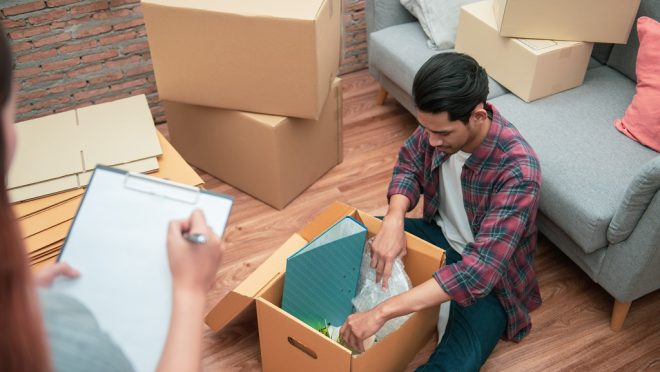Escape Plan: Mastering the Art of Moving Out
If you’re excited about moving out of your parents’ home and living independently, you’re not alone. The temptation of freedom is undeniable, but it’s worth noting that newfound independence can come with unexpected financial demands.
Escape Plan: Mastering the Art of Moving Out
If you’re excited about moving out of your parents’ home and living independently, you’re not alone. The temptation of freedom is undeniable, but it’s worth noting that newfound independence can come with unexpected financial demands.

If you’re excited about moving out of your parents’ home and living independently, you’re not alone. The temptation of freedom is undeniable, but it’s worth noting that newfound independence can come with unexpected financial demands.
The process of moving out starts well before your actual moving-out date. It requires months of planning and research, where every detail can affect your experience as a first-time mover.
The following is a basic guideline for living away from home:
Phase One: Acquiring the Skills Needed to Move Out
Learning how to budget: Financial literacy is essential when moving out. Without the ability to budget, moving out can become extremely challenging. With independence comes heaps of bills, receipts, and debt that you have to manage on your own. Starting financial literacy early can make this transition smoother.
Savings: Once you’ve mastered the art of budgeting, saving will become second nature. It’s always best to have some cash set aside for instances you may not be able to predict in advance.
Learning basic household tasks: Moving out means not only taking care of your own bills but also taking responsibility for yourself and your living space. Acquiring fundamental life skills, such as cooking, doing laundry, grocery shopping, basic repair knowledge, and other abilities that help you maintain your household in good condition, is crucial when moving out.
Phase Two: The Planning and Decision Making
Doing the market research: Research. Research. Research. When you feel that you can take care of yourself without needing too much assistance, it’s time to do some research. This is where you figure out all the nitty-gritty details. Here are some questions you might ask yourself during the process:
- Where do I want to live?
- What falls under my budget?
- Is it a safe neighborhood?
- Can I afford it alone or do I need a roommate to split the rent with?
- Can I park my vehicles?
- Is it far from my workplace/education institution?
- Is there a hospital nearby in case of emergencies?
- How far is the convenience store?
- Can I see myself living here for the next 5 years?
Packing strategically and decluttering: Before you start packing, assess your belongings and decide what to keep, sell, donate, or discard. The less you have to move, the smoother and more cost-effective the process will be. After decluttering, use durable boxes and packing materials to safeguard your possessions. Labeling each box will simplify the unpacking process.

Inspecting your new place: Once you’ve chosen your new residence, conduct a thorough inspection of your living space. Document any pre-existing damages and note any features you’d like to have altered. Inform your landlord in advance to prevent potential disputes.
Learning the rules of renting: Additionally, following the selection and inspection process, be sure to familiarize yourself with your landlord’s rules and regulations. This step is crucial because violating a rule could lead to eviction. If there are specific rules you know you won’t be able to adhere to, it’s advisable to explore other housing options.
Organizing your documents: After completing your research and decision-making, it’s time to ensure all your documents are in order. Renting involves a legal process that requires documentation. Communicate with your landlord to determine the documents they require and have them prepared and readily available when requested.
Phase Three: The Transition Phase
Familiarizing yourself with the area: After your move, take the time to acquaint yourself with the neighborhood. Get to know your neighbors, discover the nearest grocery stores, and compile a list of local electricians, mechanics, and plumbers for potential future emergencies. Explore the offerings in your neighborhood and figure out how to make the most of each amenity for your convenience.
Security measures: Feeling secure in your own space is of utmost importance. That’s why, when you move out, it’s advisable to have the phone numbers of the nearest police station at hand, install security cameras, inspect all your windows and doors’ locks, and implement any other security measures that will allow you to live peacefully in your new space.
Budgeting apps & tools: If you find budgeting challenging after your move, several online tools can make your life easier. Budgeting apps are often free to download and help you monitor your income, expenses, and come with bill payment reminders. Some popular budgeting apps include:
1. Pocketguard: For a simplified budgeting overview.
2. Honeydue: Ideal for budgeting with a partner.
3. Empower: Useful for tracking wealth and spending.
4. Goodbudget: Perfect for hands-on envelope budgeting.
5. Mint: Offers comprehensive budgeting tools.
If you prefer to track your finances in a physical format, the binder method might be the right choice for you. Assign specific compartments for various purposes, such as bills, receipts, and savings. This method also enables you to retain physical copies of your expenses should you need them in the future. Remember, moving out can be a bit overwhelming, but with careful planning and organization, it can also be an exciting and empowering experience.


